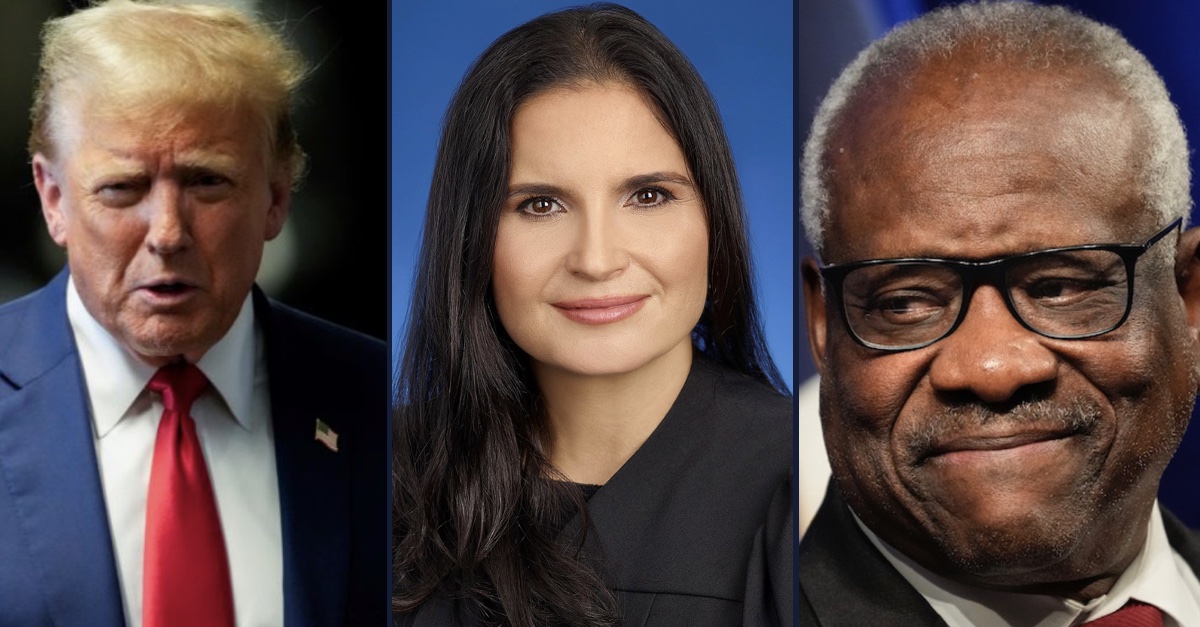
Left: Donald Trump (AP Photo/Julia Nikhinson, Pool); Center: U.S. District Judge Aileen Cannon (U.S. District Court for the Southern District of Florida); Right: Justice Clarence Thomas speaks at the Heritage Foundation on October 21, 2021 in Washington, D.C. (Photo by Drew Angerer/Getty Images).
Special counsel Jack Smith on Friday issued a terse rejoinder to defense attorneys in the Mar-a-Lago case while implicitly criticizing Justice Clarence Thomas over his concurrence in the Supreme Court case that granted Donald Trump wide-ranging presidential immunity.
In that concurrence, Thomas argued Smith’s appointment is “invalid unless a statute” with the force of law “created the Special Counsel’s office and gave the Attorney General the power to fill it.” The right-wing jurist, however, was not joined by any of his colleagues.
Still, in their effort to continue delaying and pressing for dismissal of the documents case, Trump’s attorneys cited the Thomas dicta in order to bolster a pre-existing argument they have made regarding how Smith got his job and the propriety of the special counsel’s operating budget.
Smith, in turn, has now accused the defense of trying to engineer the legal equivalent of the Hoover Dam out of a filled-in pothole.
“That single-Justice concurrence — addressing an issue that Trump did not raise, that the parties did not brief, and that was not relevant to the question presented to, or decided by, the court — neither binds this court nor provides a sound basis to deviate from the uniform conclusion of all courts to have considered the issue that the Attorney General is statutorily authorized to appoint a special counsel,” the special counsel said in a two-page notice of supplemental authority.
Days after the expansive presidential immunity opinion was released, Trump’s team told U.S. District Judge Aileen Cannon that the Thomas concurrence significantly strengthened their case.
“Justice Thomas’s concurrence in Trump adds force to the motions relating to the Appointments and Appropriations Clauses,” Trump’s attorneys said — referring to the recent immunity opinion itself as well as a landmark opinion in Morrison v. Olson that ruled the Independent Counsel Act was constitutional. “Justice Thomas cited Justice Scalia’s Morrison dissent, which is consistent with Justice Kavanaugh’s comment at oral argument in Trump that Morrison was ‘one of the Court’s biggest mistakes.””
More Law&Crime coverage: The Trump Docket: The ‘tremendous and unwarranted arrogance’ at the center of Trump’s motion to dismiss hush-money conviction
Thomas’ concurrence largely echoed arguments made by conservative amici curiae (Latin for “friends of the court”) on the Mar-a-Lago case docket. Somewhat controversially, Cannon recently heard oral arguments from several groups of amici regarding the legality of Smith’s appointment as special counsel.
Those amici asserted “private citizen” Smith’s appointment by U.S. Attorney General Merrick Garland violated the Constitution because he was neither confirmed by the Senate nor sufficiently “authorized” by statute.
Trump and his co-defendants, for their part, made similar objections to Smith’s role and funding in various defense motions.
Thomas clearly agreed with those points.
“Given that the Special Counsel purports to wield the Executive Branch’s power to prosecute, the consequences are weighty. Our Constitution’s separation of powers, including its separation of the powers to create and fill offices, is ‘the absolutely central guarantee of a just Government’ and the liberty that it secures for us all,’ Thomas wrote. “There is no prosecution that can justify imperiling it.”
More Law&Crime coverage: Mar-a-Lago judge vacates several key deadlines while giving Trump and Jack Smith the tentative opportunity to argue over SCOTUS presidential immunity ruling
While the underlying case granting Trump presidential immunity is distinct from the long-stalled Southern District of Florida case, Smith and his office are implicated in both because he is the special counsel who brought and leads both prosecutions.
If the prosecutor, therefore, stands to see the basic grant of his authority challenged (or axed) in one case, it would not entail a significant stretch to see that happen in both cases. In fact, it would be likely.
But, Smith notes, even the Trump immunity decision does not actually stand for anything like what Thomas and Trump’s defense suggest — and, Smith says, Thomas was forced to acknowledge that.
“[A]s the concurrence recognized, the Supreme Court found that the statutes on which the Government principally relies here — 28 U.S.C. §§ 515 and 533 — “support[ed] the appointment of the Special Prosecutor in United States v. Nixon,” the government’s filing concludes. “The same is true here.”
The special counsel did, on the other hand, agree the broader immunity questions implicated in the high court’s ruling require additional briefing.
Have a tip we should know? [email protected]




